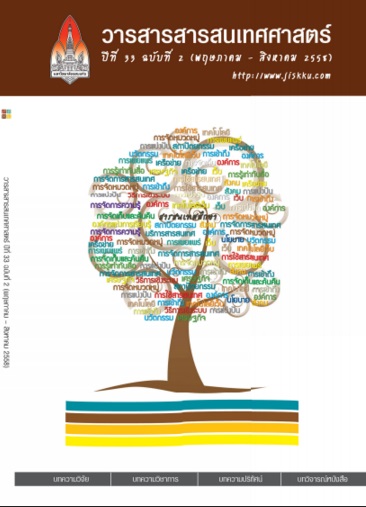กรอบแนวคิดสําหรับการตรวจสอบความสัมพันธของหัวเรื่อง สําหรับฐานขอมูลสหบรรณานุกรมสถาบันอุดมศึกษาไทย (A Framework for Subject Relation Verification of Union Catalog for Thailand Academic Libraries Database)
Keywords:
ระเบียนหลักฐานหัวเรื่อง, รายการโยง, การตรวจสอบความสัมพันธของหัวเรื่อง, หัวเรื่องภาษาไทย, Subject authority record, Cross reference, Subject relation verification, Thai subject headingAbstract
บทคัดยอ
งานวิจัยชิ้นนี้เป็นส่วนหนึ่งของงานวิจัยและพัฒนาเรื่องขั้นตอนวิธีสำหรับตรวจสอบ และควบคุมความสัมพันธของหัวเรื่อง โดยมีวัตถุประสงคเพื่อ (1) ศึกษาโครงสรางความสัมพันธของหัวเรื่องที่ปรากฏในระเบียนหลักฐานหัวเรื่อง (2) วิเคราะหขอผิดพลาดของขอมูลความสัมพันธในระเบียนหลักฐานหัวเรื่อง (3) ออกแบบกรอบแนวคิดการตรวจสอบ
ความสัมพันธของระเบียนหลักฐานหัวเรื่องสําหรับฐานขอมูล UC-TAL (4) ออกแบบขั้นตอนวิธีและพัฒนาโปรแกรมประยุกต์สำหรับตรวจสอบข้อมูลกรอบแนวคิด (5) ประเมิน ประสิทธิภาพของกรอบแนวคิด ขอมูลที่ใชศึกษา คือ ระเบียนหลักฐานหัวเรื่องที่สกัดจากระเบียนบรรณานุกรม จํานวน 544,232 ระเบียน และระเบียนหลักฐานหัวเรื่องจาก
ห้องสมุด 4 แห่ง จำนวน 245,689 ระเบียน ผลการวิจัยมี ดังนี้ (1) หัวเรื่องมีการลงรหัสเขต
ขอมูลยอยของหัวเรื่องยอยที่ผิดทําใหเกิดความซํ้าซอนของหัวเรื่องจํานวนมาก หองสมุด
แตละแหงลงรายการโยงใหกับหัวเรื่องไมตรงกัน การโยงความสัมพันธไมสมบูรณและมี
ความขัดแยงกัน (2) กรอบแนวคิดสําหรับตรวจสอบความสัมพันธของหัวเรื่องประกอบ
ขั้นตอนดังนี้ ผนวกระเบียนหลักฐานหัวเรื่องที่ซ้ำซ้อน แก้ปัญหาความไม่สมบูรณ์ของ
ความสัมพันธ สรางโครงขายความสัมพันธเชิงความหมายตามลําดับขั้น และตรวจสอบ
ความขัดแยงของความสัมพันธ (3) ขั้นตอนวิธีสําหรับการตรวจสอบความสัมพันธของ
ระเบียนหลักฐานหัวเรื่องเพื่อนําไปพัฒนาชุดคําสั่งสําหรับตรวจสอบความสัมพันธของ
ระเบียนหลักฐานหัวเรื่อง เพื่อนำไปพัฒนาชุดคำสั่งสำหรับตรวจสอบความสัมพันธ์ของ
ของหัวเรื่อง สามารถตรวจสอบความสัมพันธและสรางรายการโยงที่ไมสมบูรณโดย
อัตโนมัติ และยังตรวจสอบความขัดแยงที่เกิดขึ้นได ทําใหลดจํานวนแรงงานและเวลาใน
การตรวจสอบความสัมพันธของหัวเรื่อง กรอบแนวคิดจะนําไปสูการพัฒนาโปรแกรม
ตรวจสอบความสัมพันธ์ ของระเบียนหลักฐานหัวเรื่องตามมาตรฐาน MARC 21 ในอนาคต
Abstract
The objectives of this study were to (1) study subject authority relational
structure, (2) analyze the mistakes of relationship within subject authority data, (3)
design subject authority relation verification framework for UC-TAL, (4) design
algorithms and develop application programs for examining the result of the
framework, and (5) to evaluate performance of the framework. The experimental
data set consisted of 544,232 authority records extracted from bibliographic records
and 245,689 authority records from authority files of four academic libraries. The
study found that redundant subject authority records were found in significant amount
due to using wrong subdivision code and different cross reference as well as
largely found incomplete and inconsistent subject relations. The subject authority relation verification framework was subsequently proposed to achieve the problem
– designed in following steps: merging similarity records, resolving incomplete
relations, constructing semantic hierarchical network, and verifying conflict relations.
Algorithm was developed in order to verify subject relations corresponding to the
method described in the framework. Result of using the framework showed
that redundant records were significantly decreased as well as incomplete and
conflict subject relations were automatically detected and resolved. With the result,
operation cost for time and staff efforts in subject relation verification task had been
also saved. The proposed framework will be further developed for the MARC 21
subject authority relation verification.








